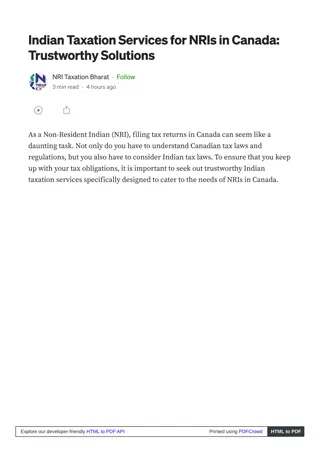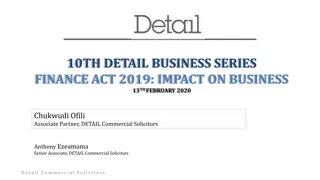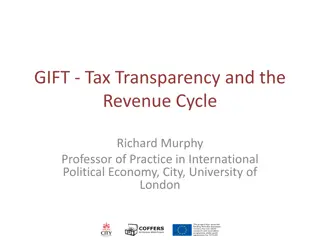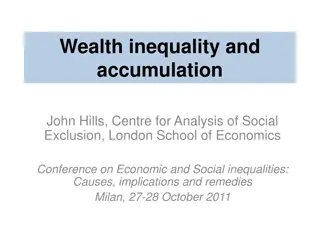
Proposed Tax Law Changes Impact on Personal Wealth
Learn about the potential impact of proposed tax law changes on personal wealth, including adjustments to income tax brackets, capital gains rates, surcharges, IRA contributions, jumbo retirement accounts, and other noteworthy changes affecting high-income individuals. Stay informed to manage your financial strategies effectively.
Download Presentation

Please find below an Image/Link to download the presentation.
The content on the website is provided AS IS for your information and personal use only. It may not be sold, licensed, or shared on other websites without obtaining consent from the author. If you encounter any issues during the download, it is possible that the publisher has removed the file from their server.
You are allowed to download the files provided on this website for personal or commercial use, subject to the condition that they are used lawfully. All files are the property of their respective owners.
The content on the website is provided AS IS for your information and personal use only. It may not be sold, licensed, or shared on other websites without obtaining consent from the author.
E N D
Presentation Transcript
The Impact Proposed Tax Law Changes May Have on your Personal Wealth David Butts Senior Wealth Strategist Lead
Top Tier Income Tax Bracket Proposal Currently 37% Proposed 39.6% Build Back Better 2022 Tax Brackets Expected 2022 Tax Brackets Filing Status $539,000 or more Single Filers $400,000 or more $539,900 Head of Household $425,000 $647,850 Married Filing Jointly $450,000 2
Long Term Capital Gains The current 20% capital gains tax rate will be replaced with a 25% tax. The breakpoint for the 25% tax bracket is aligned with the proposed top tiered ordinary income tax bracket. This proposal has an effective date of 9/14/2021. 3
Surcharges There will be a 3% surtax on individuals with an AGI in excess of $5 million. Net investment Income tax of 3.8% will include S Corp shareholders, LP, and LLC members that are not currently participating in the trade or business 4
IRA Contribution Changes No contributions for taxpayers in top tax bracket and IRA balances that exceed $10 million Elimination of the backdoor Roth IRA Elimination of Roth Conversions for taxpayers in top tax bracket beginning in 2032 5
Jumbo Retirement Accounts A new distribution requirement for 39.6% tax bracket and a combined retirement balance over $10 million. Required Minimum Distribution is not based on age. $10 million and $20 million Rules Excess over $10 million is required to distribute 50% in the excess retirement balances. Excess over $20 million is required to distribute 100% on the excess retirement balances. 6
Other Noteworthy Changes Cuts Qualified Small Business Stock exclusion down to 50% level for taxpayers with $400,000 or more. Increases the holding period from 3 years to 5 years for carried interest to receive capital gains tax rates. Limits the QBID for certain high-income taxpayers. 7
Gift and Estate Tax Exemptions Reduces the estate and gift tax exemption amount on 1/1/2022 by 50% General belief is that strategies implemented before 1/1/2022 will be grandfathered Elimination of Valuation discounts for Passive investments. Grantor Trust transfers includable in the taxable estate. 8
Corporate Taxes for C Corporations The corporate flat tax rate 21% will be replaced with the below graduated tax schedule: Income Tax Rate $1 - $400,000 18% $400,001 - $5,000,000 21% Over $5,000,000 26.5% * Certain credits will phase out for income over $10 million. 9
Notable Proposals Absent from the Act SALT Like-kind Exchange treatment Step-up in basis at death 10
Case Study Corporate Executive Strategies Married Exec with Non Qualified Stock Options $ 75,000 value of unexercised stock options $50,000 of unrecognized capital gain on exercised stock options Salary of $475,000 Ordinary Income Tax / Capital Gains Tax Accelerate or Wait to See Approach 11
Case Study Wealth Transfer Individual Business Owner Net Worth $10M Estate Tax Exemption $12.06M per individual would drop to $6.03M Gifting through Grantor Trust Appreciable Assets Discounts Active Business Valuation Timing Formula Approach 12
Disclosure BMO Private Bank is a brand name used in the United States by BMO Harris Bank N.A. Not all products and services are available in all locations. Banking products and services offered by BMO Private Bank are provided by BMO Harris Bank N.A. and are subject to bank and credit approval. Member FDIC. Trust and estate planning requires legal assistance, which BMO Harris Bank N.A. does not provide. Please consult with your legal advisor. This information is not intended to be tax or legal advice. This information cannot be used by any taxpayer for the purpose of avoiding tax penalties that may be imposed on the taxpayer. This information is being used to support the promotion or marketing of the planning strategies discussed herein. BMO Harris Bank and its affiliates do not provide legal or tax advice to clients. You should review your particular circumstances with your independent legal and tax advisors. BMO and BMO Financial Group are trade names used by Bank of Montreal. BMO Harris Bank is a trade name used by BMO Harris Bank N.A. Investments are: NOT A DEPOSIT- NOT INSURED BY THE FDIC OR ANY FEDERAL GOVERNMENT AGENCY- NOT GUARANTEED BY ANY BANK-MAY LOSE VALUE. 13

![Town of [Town Name] Real Estate Tax Rates and FY 2024 Budget Summary](/thumb/62211/town-of-town-name-real-estate-tax-rates-and-fy-2024-budget-summary.jpg)




















